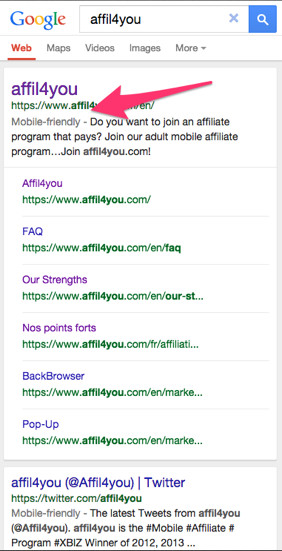Affil4You Takes Guesswork Out of Google’s ‘Mobilegeddon’
 PARIS – Google is steadily rolling out its new “mobile-friendly” mandate, lending a new dimension to “adapt or die”: A website’s adaptability — or inability to adapt — to viewing on multiple screens will have a significant impact on its SEO rankings. Google’s new algorithm takes mobility into account in its rankings.
PARIS – Google is steadily rolling out its new “mobile-friendly” mandate, lending a new dimension to “adapt or die”: A website’s adaptability — or inability to adapt — to viewing on multiple screens will have a significant impact on its SEO rankings. Google’s new algorithm takes mobility into account in its rankings.
According to the developers at Affil4You, it’s imperative that all website operators test their sites immediately to ensure Google’s “mobile-friendly” label will appear next to their listing in the search engine’s results pages.
First, it’s important to understand two definitions:
“Google-friendly” indicates Google will think a referenced page provides a positive user experience. If, in Google’s opinion, a page does not provide a good user experience, the search engine penalizes and demotes the page. As a consequence, the page receives less traffic or none at all.
“Mobile-friendly” indicates Google believes a page will provide a good user experience on mobile devices. As of April 21, pages that provide a pleasant user experience on mobile devices will rank higher in the search engine’s results, particularly if the search was accessed on a mobile device.
When Google analyzes a page to see if it is suitable for mobiles, it examines all aspects of the page’s construction, including any scripts.
Webmasters who do not have mobile-friendly sites but want to ensure they are both Google-friendly and mobile-friendly while not expending additional funds as they try to maintain revenues may wish to check out Affil4You’s Google-friendly template. The tool automatically adapts standard webpages for mobile viewing. The tool is free to use.
“How do we make money?” Affil4You Managing Partner Joey Gabra asked. “We just add our money-earning banners to the mobile version and give you the biggest share. The content is the same on mobile and on the web, and Google keeps your ranking. This tool is therefore Google-friendly and mobile-friendly. Plus, it’s 100-percent secure.”
 If your site is mobile-compatible, you may already find the “mobile-friendly” label associated with your site in Google’s SERPs. If you don’t see the label, either Google hasn’t evaluated your site yet, or it doesn’t like what it found when it did evaluate your site.
If your site is mobile-compatible, you may already find the “mobile-friendly” label associated with your site in Google’s SERPs. If you don’t see the label, either Google hasn’t evaluated your site yet, or it doesn’t like what it found when it did evaluate your site.
If you don’t want to “mobilize” your site or Google hasn’t acknowledged your mobilization, Affil4You offers other options for monetizing traffic. All of them are mobile-friendly, since they were created especially for mobile devices.
Pop-ups: A click on your page opens an optimized Affil4You campaign.
Mobile Mask: An interstitial ad appears on top of your site. You can see what the tool looks like by clicking here using a mobile device.
Be aware: The tools are mobile-friendly, but they will have no effect on search engine rankings if the underlying site isn’t.
“Do not forget that you can adapt elements of your website to be mobile-friendly by customizing your template based on the user-agent of the terminal,” Gabra said. “You may also use responsive design, which adapts to the width of whatever screen is viewing your website. Adding a viewport meta tag can also adapt the size of the text on your page to the devices. You may also use our Pop-in tool on your mobile-friendly website.”
To test the mobile-friendliness of your website, visit this page at Google.com, specify the URL of the site or page you wish to check, and then click “Analyze.”
For more information about designing adaptive websites, visit Google’s basics of designing adaptive websites tutorial. For more about mobile SEO, visit Google’s how-to and learn the methods Google recommends for selecting the configuration of your mobile site.
For more information about Affil4You, one of the largest mobile affiliate programs in the adult industry, visit Affil4You.com.









